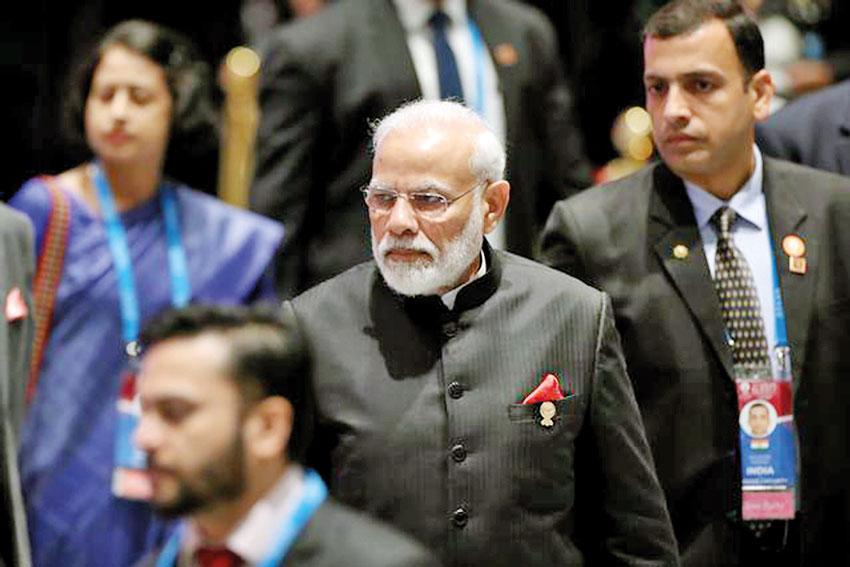Reply To:
Name - Reply Comment
Last Updated : 2024-04-26 22:10:00

India opted out from the RCEP negotiations on November 4, 2019 (pic reuters)
China itself viewed it as a victory for multilateralism and free trade
It is not yet clear how US President-elect Joe Biden will respond
The regional Comprehensive Economic Partnership saw the light of day on November 15
A section of the Western Media projected it as nothing but an extension of China’s influence in the region
 In years, super-power rivalries have intensified. It climaxed with a trade war between the United States and China. The spat between the world powers is playing out in the Indian Ocean region with a particular focus on China’s rise and increased involvement in transnational trading.
In years, super-power rivalries have intensified. It climaxed with a trade war between the United States and China. The spat between the world powers is playing out in the Indian Ocean region with a particular focus on China’s rise and increased involvement in transnational trading.
As far as China’s economy with the global market is concerned, a watershed event took place on November 15 when it became party to the world’s largest multilateral trading bloc. In this instance, 15 countries formed this bloc by signing an agreement after negotiations launched way back in November 2012. Finally, the Regional Comprehensive Economic Partnership (RCEP) saw the light of day on November 15. The pact involves 10 Southeast Asian countries. Apart from China the other big names signing the pact are South Korea, Japan, Australia and New Zealand; as the region’s free trade partners.

It was signed on a Sunday on the sidelines of a virtual meeting of the Association of Southeast Asian Nations (ASEAN). It drew widespread global attention with advocates of trade liberalization seeing it as a triumph of multilateralism and free trade. However, a section of the western media projected it as nothing but an extension of China’s influence in the region.
The agreement is undoubtedly a step forward in the economic integration of East Asia. China itself viewed it as a victory for multilateralism and free trade.
ASEAN is a region of ten countries—Brunei, Cambodia, Indonesia, Laos, Malaysia, Myanmar, Philippines, Singapore, Thailand, and Vietnam. Their free trade partners are Australia, China, India, Japan, New Zealand and the Republic of Korea. Accordingly, it is a trade agreement that is comprehensive in nature, and covers trade in goods and services, investment, economic and technical cooperation. The pact provides for new rules on electronic commerce, intellectual property, government procurement, competition, and small and medium sized enterprises.
The agreement will cover a market of 2.2 billion people, which accounts for 30% of the world’s population. It also covers a combined GDP (Gross Domestic Product) of US$ 26.2 trillion—about 30 percent of global GDP—and accounts for nearly 28% of global trade based on last year’s figures.
Once in force, the RCEP will phase out 90% of the tariffs on imports between the countries which are party to it.
The Joint Leaders’ statement on the RCEP issued after the summit said, “We were pleased to witness the signing of the RCEP Agreement, which comes at a time when the world is confronted with the unprecedented challenge brought about by the Coronavirus Disease 2019 (COVID-19) global pandemic. In light of the adverse impact of the pandemic on our economies, and our people’s livelihood and well-being, the signing of the RCEP Agreement demonstrates our strong commitment to supporting economic recovery, inclusive development, job creation and strengthening regional supply chains as well as our support for an open, inclusive, rules-based trade and investment arrangement. We acknowledge that the RCEP Agreement is critical for our region’s response to the COVID-19 pandemic and will play an important role in building the region’s resilience through inclusive and sustainable post-pandemic economic recovery process.”
It added, “We also note that the RCEP Agreement is the most ambitious free trade agreement initiated by ASEAN, which contributes to enhancing ASEAN centrality in regional frameworks and strengthening ASEAN cooperation with regional partners. With 20 Chapters, the RCEP Agreement, as a modern, comprehensive, high-quality and mutually beneficial agreement, includes areas and disciplines that were not previously covered in the existing free trade agreements between ASEAN and non-ASEAN countries participating in RCEP. Aside from the specific provisions that cover trade in goods and services, and investment, RCEP also includes chapters on intellectual property, electronic commerce, competition, small and medium enterprises (SMEs), economic and technical cooperation and government procurement. We are confident that the RCEP Agreement would open a vast range of opportunities for businesses located in the region especially in terms of market access given the level of liberalisation for trade in goods and services and investment,”.
That the RCEP is the world’s largest trading bloc is now a fact with proof. The argument that it is a victory of free trade also holds water since the signing of the pact was realised at a time when some countries in the world were calling for protectionism.
India opted out from the RCEP negotiations on November 4, 2019 citing various issues such lack of protection against a surge of imports into the country. But, the doors still remain open for India’ accession if it decides at a later stage. The leaders of the signatory countries also echoed that they remained open for the inclusion of India in the future, given its importance as a strategic partner.
The RCEP will, however, come into effect only 60 days after six ASEAN member states and three non-ASEAN member states have ratified the agreement in their respective national parliaments. It is also a challenging task given anti-Chinese political sentiments in some of these countries.
The economic integration in the East Asian region will become a reality once the ratification is over. Then, the pact will enable China to tie up with the global market in increased dimensions. The leaders of these 15 countries have sounded optimistic that the agreement will facilitate post-pandemic economic recovery.
In international and foreign affairs, economic and geopolitical interests do not necessarily work hand in hand with each other. It is true that health political relations between nations are important for economic tie-ups. The RCEP is a classic example otherwise. Some of the member states such as Australia and Japan even have competing geological interests with China. In fact, these two countries are part of ‘Quadrilateral Security Dialogue’ which also involves the United States and India. It is a grouping formed to check on China’s presence in the Indo-pacific region from a maritime security perspective.
But, such differences have not stood in the way of trading in goods and services.
The United States, under the administration of President Donald Trump, pulled out from the 11-nation Trans-Pacific Partnership (TPP) trading agreement.
Its trading clout will diminish in the region as a result. It is not yet clear how President-elect Joe Biden would respond under his administration regarding bilateral or multilateral free trade agreements.

Add comment
Comments will be edited (grammar, spelling and slang) and authorized at the discretion of Daily Mirror online. The website also has the right not to publish selected comments.
Reply To:
Name - Reply Comment
US authorities are currently reviewing the manifest of every cargo aboard MV
On March 26, a couple arriving from Thailand was arrested with 88 live animal
According to villagers from Naula-Moragolla out of 105 families 80 can afford
Is the situation in Sri Lanka so grim that locals harbour hope that they coul

4 hours ago
6 hours ago